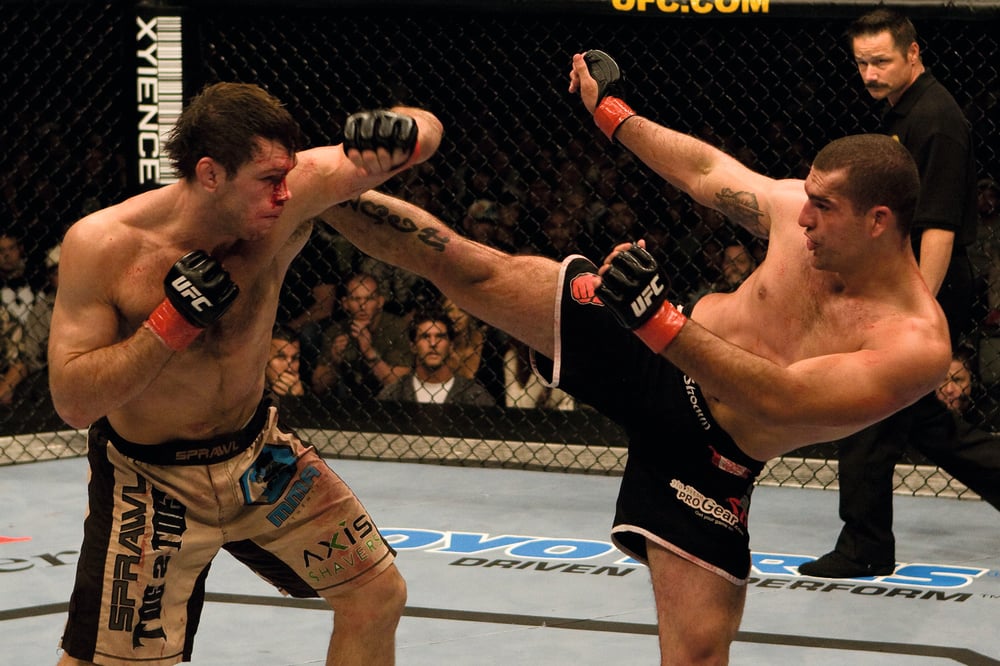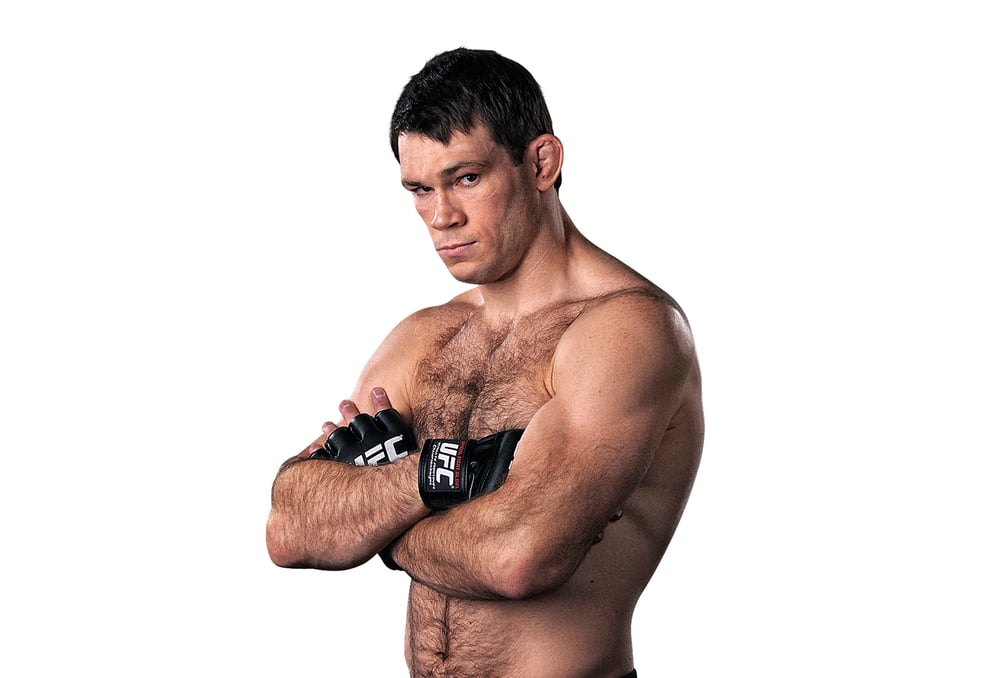
Issue 078
August 2011
Former UFC champion Forrest Griffin is winning the game using his own rules.
If you’re ever in an elevator or on an airplane and you happen to notice Forrest Griffin within arm’s length of you, remember two things: don’t put your hands on him, and if you talk to him, don’t ask him a question he’s been asked a million times before like, ‘What it’s like to be a fighter,’ because he may pretend he’s not who you think he is or that he doesn’t understand English.
“Man, I hate being groped by people, and it happens all the time,” he explains with a hint of disgust in his voice. “And I’m not really sure how Twitter works, but I really do answer questions the first time I see them on there. The tenth time I see them, or even the third, fourth or fifth or whatever, I don’t really answer them anymore. I don’t know how it works or how you can go back and find the answers, but I’ll answer a question once, then I move on.”
It’s nothing personal, the 31-year-old former UFC light heavyweight champion points out, it’s just that he likes a bit of variety in his life, which is why he sometimes doesn’t want to talk shop when he’s not on the clock. “People almost get a bit upset if I tell them I missed a fight or didn’t watch an event. I can’t just watch and just enjoy a fight,” he explains. “I get insecure and say, ‘Why am I not training?’ and, ‘Why don’t I do something like that?’ Your mistress, becomes your wife, becomes your master. Any job, given a long enough period of time, becomes a job, no matter how much you enjoy it.”
When you think about it, it makes sense. When fighting is your job, it’s no different than any other job in the sense that, in your time off you don’t want to think about work. Ask a mechanic or a psychiatrist what they do on their days off and its unlikely they’ll say they “fix cars” or “diagnose mental illnesses.” That’s not to say Griffin doesn’t enjoy fighting, interacting with fans or doing media tours, it’s just that he prefers to do each one on his own terms under ideal conditions.
“[Media] tours and appearances kind of make a man out of you. You’re at wit’s end, you’re not sleeping, you don’t know what’s going on, you’ve been eating weird s**t and then all of a sudden you’re in front of a large group of people and it’s like, ‘Wow, I have to talk now and I’m exhausted.’ For me it’s tough because I hate breaking routine. When I travel I eat poorly, I drink, I work out less often and get less sleep. Those kinds of things can get to you when you consider yourself an athlete,” Griffin says. “I actually care if I win or lose fights. I couldn’t care less about media stuff. Doing media stuff isn’t bad at all if you can amuse yourself at the expense of others. I’ve found a way to make it fun. I push people to see how much they’ll take before they’re like, ‘Really? You’re kind of an a**hole,’ and I’m like, ‘Yep.’”

A reputation of being a tough interview precedes Griffin, and he readily admits that he doesn’t make it easy on reporters to get a quote or a sound bite, especially if they haven’t done their research or they try to sway his answers to suit the context of the story they’re writing.
But much like his training partners do with him when they spar while he’s preparing for fights, he explains that he’s just testing the mettle of the interviewers when he offers some resistance.
“My biggest complaint – and this has happened a lot recently – is that interviewers want to kind of tailor my answers to the story they’ve already got in their heads. I understand where they’re coming from, from writing papers and whatnot, but they get almost dissatisfied with the answer you give them like you’ve ruined their story because you say something totally different than the other guys they’ve interviewed,” Griffin says. “I’ve had a bunch of interviews where I didn’t even talk about fighting, but that’s just because I made them that way. When you don’t give a reporter answers, sooner or later they’ll talk about what you want to talk about. I once told this guy that I had a tiger, and we talked about it for like half an hour. I thought it sounded reasonable because I just saw a show about these people who had a pet tiger. I ran into him like a year later and he asked me how my tiger was and I was like, ‘What are you talking about, man? What are you on? I don’t have a tiger. Nobody’s got a tiger.’”
Pretenses and pet tigers aside, Griffin is a fighter in every sense of the word – a competitor who by hook or by crook uses every ounce of skill, cunning and heart to do whatever necessary to win fights and entertain the fans, perhaps in spite of himself. He reveals that the pressure on a fighter coming from all angles increases tenfold as the stakes go up, which makes it tougher and tougher to ignore, no matter how hard you try.
“Fighting would be great if it wasn’t your livelihood and the outcome didn’t matter. I’ve realized that people don’t owe me anything and I don’t owe them that much either. Anything I do, I do for me,” he says. “I want to perform because I want to do my best. It’s what I do. I do care what people think, maybe too much, or enough that I try to shield myself from it by saying I don’t care. I don’t know.”

With as important of a fight as Forrest has coming up in August, against fellow former UFC light heavyweight champion Mauricio Rua, it’s somewhat surprising to hear that he seems less than enthused about the bout. It isn’t that the prospect of a rematch with ‘Shogun’ itself isn’t exciting to him, it’s that he has to travel outside of his comfort zone once again for the bout. The fight itself he has no problem with, it’s the extrinsic factors that make him grit his teeth.
“I’m old. I’ve been to Brazil before. I fought down there twice. I don’t want to go to Brazil,” Griffin says matter-of-factly. “I don’t travel very well and it’s really hard for me to make weight in foreign countries where I don’t know what the food is.” And in case you were wondering, Forrest says that contrary to popular belief, he isn’t looking at the upcoming bout as an opportunity to silence his critics who say he only won the first time they squared off because Shogun was out of shape and coming off of an injury. He’s just looking at it for what it is: a fight – and a damn good one at that.
“I haven’t thought about proving anybody wrong at all,” he says. “All that I’ve thought about is that [the fight] is in Brazil.” Beating Rua for a second time will undoubtedly propel Forrest back into the title picture, which he kind of faded from after being sidelined for about a year due to a shoulder injury before returning to action to handily defeat Rich Franklin at UFC 126 in February. Although he doesn’t see himself fighting into his late forties like his good friend and MMA role model Randy Couture, Griffin says he still has plenty of fight left in him. “Obviously this is something that can change, but I’m thinking I’ll fight until I’m 35. I probably have about eight more fights left in me,” he says, pointing out that as the years go by recovery from the nagging injuries associated with training and competing begin to take more of a toll. “Something I learned from Randy was how to be a little smarter in my training and I’d like to think I’ve done that. You can either go into a fight injured, or you can go into a fight unprepared. No matter if you’re training or fighting, you’re going to get banged up – some more so than others.”
Speaking of Couture, Griffin says that although it was tough seeing a fighter he has admired for as long as he can remember say goodbye to his fighting career, he will always cherish the memories he has of his time spent training alongside ‘The Natural.’ “I saw the UFC when I was in high school and I thought it was stupid… I’m talking about the early ones. The first fight that I ever saw that made me say, ‘Hey, I want to do that,’ was the first time Vitor [Belfort] and Randy fought,” he recalls. “That UFC I watched and I was like, ‘Man, that’s a sport. That’s something I could kind of get into.’ For me, that was the start of the sport. One of the things that appealed to me most about doing [The Ultimate Fighter] was that Randy and Chuck were going to be there. Those were the guys. They were basically the sport at the time.”
Since winning TUF and moving to Las Vegas to train with Randy at Xtreme Couture, Griffin says that besides the countless pointers and experiences Randy passed on to him and his peers, one of the most valuable lessons he took away from his time spent with the UFC Hall of Famer was how to effectively dictate where the fight goes and then how to capitalize on it.
“We all work positions, but Randy seemed to always put the fight in the position where he wanted it – where he put in the work. That’s one of the things that I’ve always taken from him is drilling the spots and breaking the fight down more specifically,” Forrest explains. “Where exactly are we going to end up, what exactly are we going to do, how can I make it the way I want it and how can I get ready for that one success?”
Even though he says he has at least eight more bouts and approximately three more years worth of time left in the Octagon, Forrest is looking ahead at his life after fighting. Besides continuing to put out books “till the wheels fall off,” he says that there’s another ironic career path that could be in his future.
“I have another book we’re working on, because why not? People were dumb enough to buy the last one so I’m not going to quit until I only sell like eight copies. If Chelsea Handler can keep writing books, so can I, damn it,” he says. “I’ll probably end up being a sportscaster or something after I retire and I’ll have guys f***ing with me to see how much I can take before I’m saying they’re a**holes.”










